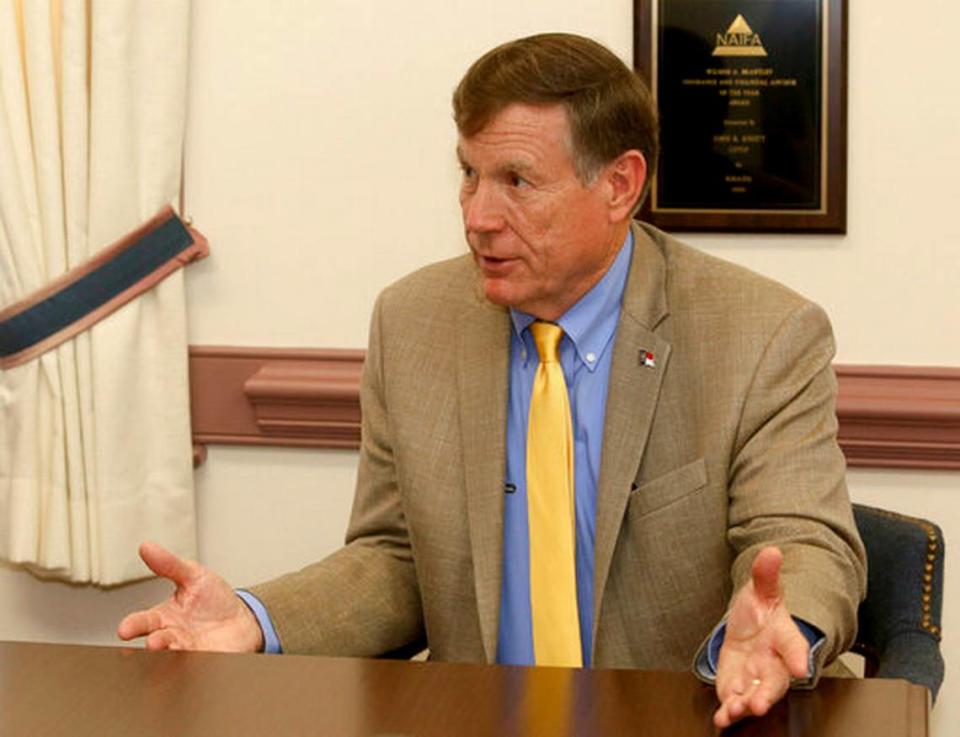‘We’ll put money in the bank.’ Recordings detail evidence as NC bribery trial opens
Was Greg Lindberg offering to pay North Carolina’s insurance commissioner a $2 million bribe?
Or was the billionaire insurance magnate a victim of entrapment by the commissioner?
As Lindberg’s federal trial got underway Wednesday, it became clear that jurors in the case will need to sort through those questions.
Lindberg and associates John Gray and John Palermo, along with then-GOP Chairman Robin Hayes, were indicted last spring on charges that they attempted to funnel bribe money to the reelection campaign of state Insurance Commissioner Mike Causey.
Their goal, prosecutors contend, was to persuade Causey to remove a deputy insurance commissioner responsible for regulating one of Lindberg’s companies.
Hayes, a former congressman, pleaded guilty in October to lying to federal investigators and faces up to six months in prison. His sentencing is expected after the trial.
On Wednesday afternoon, jurors heard from Causey, who said he grew concerned about the company’s intentions in 2017 — and later began wearing a clandestine recording device to help the FBI investigate possible bribery attempts.
Causey, a Republican who was elected in 2016, said the insurance department was conducting a financial examination of one of Lindberg’s companies in 2017. Ensuring financial solvency of insurance companies is one of the department’s chief responsibilities.
Lindberg donated $10,000 to Causey’s reelection campaign in early 2017 — during the same week insurance department officials were scheduled to meet with leaders of one of Lindberg’s companies. Causey said he directed his campaign finance director to return the money.
Lindberg and representatives of his company met with Causey in November of that year and asked him to put in a good word for them with the commissioner of insurance in Michigan, where they wanted to acquire another company.
Soon afterward, Gray told Causey that Lindberg had donated $500,000 to the state Republican Party — and that $110,000 of that money would be coming to Causey’s reelection campaign, the commissioner said.
“It seemed like they wanted to reward me for doing that (putting in a good word with the Michigan insurance commissioner),” Causey testified.
Causey later brought his concerns to federal authorities and began cooperating with their investigation into Lindberg and his associates. The commissioner wore a recording device that captured hours of phone calls and conversations between him, Lindberg, Gray and Palermo.
Recordings played for the jury on Wednesday showed that Lindberg was clearly unhappy with Jackie Obusek, the deputy insurance commissioner responsible for overseeing his companies. They contended Obusek didn’t like Lindberg and was unfairly tarnishing his reputation.
In those conversations, Lindberg and Gray urged Causey to remove Obusek from overseeing Lindberg’s companies and replace her with a new regulator — Palermo, who at the time was working for Lindberg.
In a March 2018 meeting that Causey recorded for the FBI, he and Lindberg talked about how the insurance department could hire Palermo. Lindberg also told the commissioner at that meeting that his people could set up an independent expenditure committee to support his reelection campaign and “put in a million or two or whatever.”
Gray reiterated the offer during a later phone conversation. He told Causey in the recorded conversation that if they could get Palermo hired and resolve other issues, “there will be at least $1 million in your reelection.”
According to James Mann, a prosecutor with the U.S. Justice Department’s Public Integrity Section, Gray made it clear what Causey would gain by moving Obusek: “We’ll put the money in the bank.”
“That’s bribery, plain and simple,” Mann told the jury.

Defense lawyers: It was a setup
But defense lawyers argued that Causey pushed for a federal investigation into Lindberg because he was troubled by the financial support that Lindberg had provided to his chief political opponent — former insurance commissioner Wayne Goodwin.
Lindberg donated at least $9,500 to Goodwin during the 2016 race, according to state records.
“The evidence will show this was a setup,” said Brandon McCarthy, one of the attorneys representing Lindberg.
As evidence, McCarthy recounted what Causey said in one conversation in which Lindberg’s associates requested that Obusek be removed from the job: “What’s in it for me?”
Lindberg in recent years became one of North Carolina’s largest political donors. He owns Global Bankers Insurance Group, a managing company for several insurance and reinsurance companies. Under that brand, Lindberg acquired more than a dozen insurance companies since 2014 with more than $9 billion in life insurance and annuity assets, according to his website.
Lindberg bought life insurers in the U.S. and abroad and loaned at least $2 billion of their assets to entities he controlled, the Wall Street Journal has reported.
Causey previously told the Observer his regulators had questions about the practices and financial health of Lindberg’s companies.
For example, he said, a standard guideline in the industry is for no more than 10% of an insurance company’s money to be invested in affiliated companies. But under former commissioner Goodwin, the insurance department loosened the rules, allowing a larger percentage — close to 40% — to be invested in affiliated companies, Causey said.
“There were loopholes being exploited,” Causey told The Observer.
Listen to our daily briefing:

